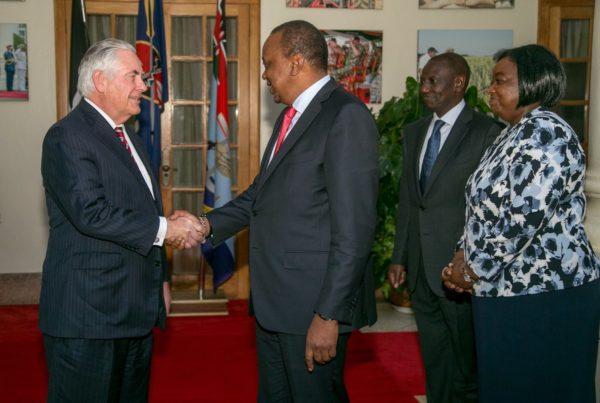NEWS
US Secretary of State, Rex Tillerson ill in Kenya

The United States Secretary of State Rex Tillerson cancelled scheduled events on Saturday on the second day of a visit to Kenya because “he is not feeling well”, a State Department spokesman said.
“The secretary is not feeling well after a long couple days working on major issues back home such as North Korea and has canceled his events for the day,” spokesman Steve Goldstein said.
The announcement comes little more than 24 hours after US President Donald Trump stunned the world by accepting an invitation to meet North Korea’s Kim Jong Un before the end of May.
The audacious diplomatic gambit, which was taken before consulting key confidantes including Tillerson — who was in the Ethiopian capital Addis Ababa at the time — left aides scrambling to catch up.
Just hours before the summit announcement, which emerged late on Thursday, Tillerson had said Washington was “a long way” from talking directly to North Korea as he kicked off his five-nation Africa tour.
The US diplomat, who arrived in Nairobi on Friday, had been due to visit the AIDS-relief programme PEPFAR on Saturday and also attend a ceremony marking 20 years since Al-Qaeda bombed the US embassies in Kenya and Tanzania, killing 224 people.
Plans to lay a wreath at the site could be rescheduled, Goldstein said.
Tillerson is due to travel to Chad on Monday then on to Nigeria a day later.
Tillerson arrived Kenya on Friday after visiting Ethiopia and Djibouti.
After talks with President Uhuru Kenyatta on Friday, he told newsmen he had shared his concerns with Kenyatta about the importance of democracy and said the government should not stifle the media and threaten the courts.
The Kenyan government shut down three television channels in January on the day opposition leader Raila Odinga took a symbolic presidential oath, then defied a court order to switch them back on. The stations had planned to live-stream the oath.

“We believe that there are actions that need to be taken in Kenya and that they need to correct certain actions like shutting down independent TV stations and threatening the independence of the courts,” Tillerson told a news conference in the Kenyan capital.
“I know Kenya takes these matters seriously. A free and independent media is essential for safeguarding democracy and giving all Kenyans confidence in their government.”
Asked at the news conference with Tillerson if Kenya could call itself a democracy in light of restrictions appeared intended to stifle dissent, Kenya’s foreign affairs minister, Monica Juma, said that “the notion that there is a restriction of the media is not backed by fact or reality.
She said that only “three of more than 10s” of TV stations were temporarily shut down. The three stations taken off air reach the majority of viewers in the country.
In September, after Kenya’s Supreme Court overturned President Uhuru Kenyatta’s election victory and ordered a new poll, Kenyatta dismissed the judges as “wakora”, meaning “crooks” in Swahili. He also said the country had a “problem” with its judiciary that needed to be fixed.
Tillerson, the top U.S. diplomat, praised Kenyatta and opposition leader Odinga for meeting on Friday and pledging to bring their people together after last year’s contentious and bloody elections.
“All the credit” for the meeting went to the Kenyan political leaders, Tillerson said, in response to a question as to whether the U.S. had a role in organizing it.
As expected, Tillerson also emphasized the U.S. security partnership with Kenya and what he called “our shared fight against terrorism”. He said he would pay his respects on Saturday in Nairobi to victims of the 1998 bombings of the U.S. embassies in Kenya and Tanzania. The bombings killed 224 people.
He also recognized the 4,000 Kenyan troops fighting al-Shabaab in Somalia as part of the African Union peacekeeping mission AMISOM.







